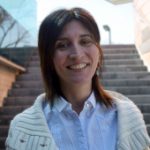
Cristina Bertocchi
- Sitio Personal: URL
- Teléfono: +562 2354 2875
- E-mail: cbertocchi@bio.puc.cl
- Ubicación Oficina: Edificio N°140 - 5º piso
Líneas de Investigación:
My research interest focuses on understanding the molecular basis and dynamics regulating complex physiological function, in particular how cells communicate, interact and sense mechanical stimuli.
Cells sense their physical surroundings through mechanotransduction, by translating mechanical forces and deformations into biochemical signals. These signals can adjust cellular and extracellular structures in a mechanosensitive feedback that modulates cellular functions as diverse as migration, proliferation, differentiation and apoptosis, and is crucial for organ development and homeostasis. Consequently, defects in mechanotransduction are implicated in the development of various diseases, ranging from muscular dystrophies, cardiomyopathies and atherosclerosis, to cancer progression and metastasis. The advent of superresolution microscopy helped to demonstrate that mechanotransduction is largely modulated at the level of protein-protein interaction within protein complexes, effectively working as nanoscale machineries. One of such mechanotransducing complex is the Adherens Junction (AJ), an adhesion complex mediating cell-cell interaction. Our laboratory aims to investigate the role played by key proteins within this complex in mediating cell-cell adhesion and the mechanotransduction therein. This non-trivial task requires a multidisciplinary approach. Hence, we make use of various in-vitro and cell-based techniques to investigate the molecular bases of the process. Our approach largely leverages from our expertise in microscopy techniques such as superresolution, FRAP, FRET and laser ablation. Furthermore, we do employ quantitative analysis, gene manipulation, mass-spectroscopy, microfabrication and mathematical modeling to elucidate the molecular structure, organization and dynamics of cell-cell adhesive junctions under force. The results of these studies will advance our understanding of the physiology of tissue development and homeostasis, as well as of cancer transformation and metastasis.
Cursos en los que Participa:
- BIO4233 - BASES CELULARES Y MOLECULARES DE LA REGULACIÓN FISIOLÓGICA
- BIO4234 - SEÑALIZACIÓN PARA LA FISIOLOGÍA Y PATOFISIOLOGÍA
- BIO4033 - MÉTODOS DE MICROSCOPÍA ÓPTICA, ELECTRÓNICA E INMUNOHISTOQUÍMICA
- BIO4417 - CURSO DE VERANO MICROSCOPÍA ÓPTICA AVANZADA
